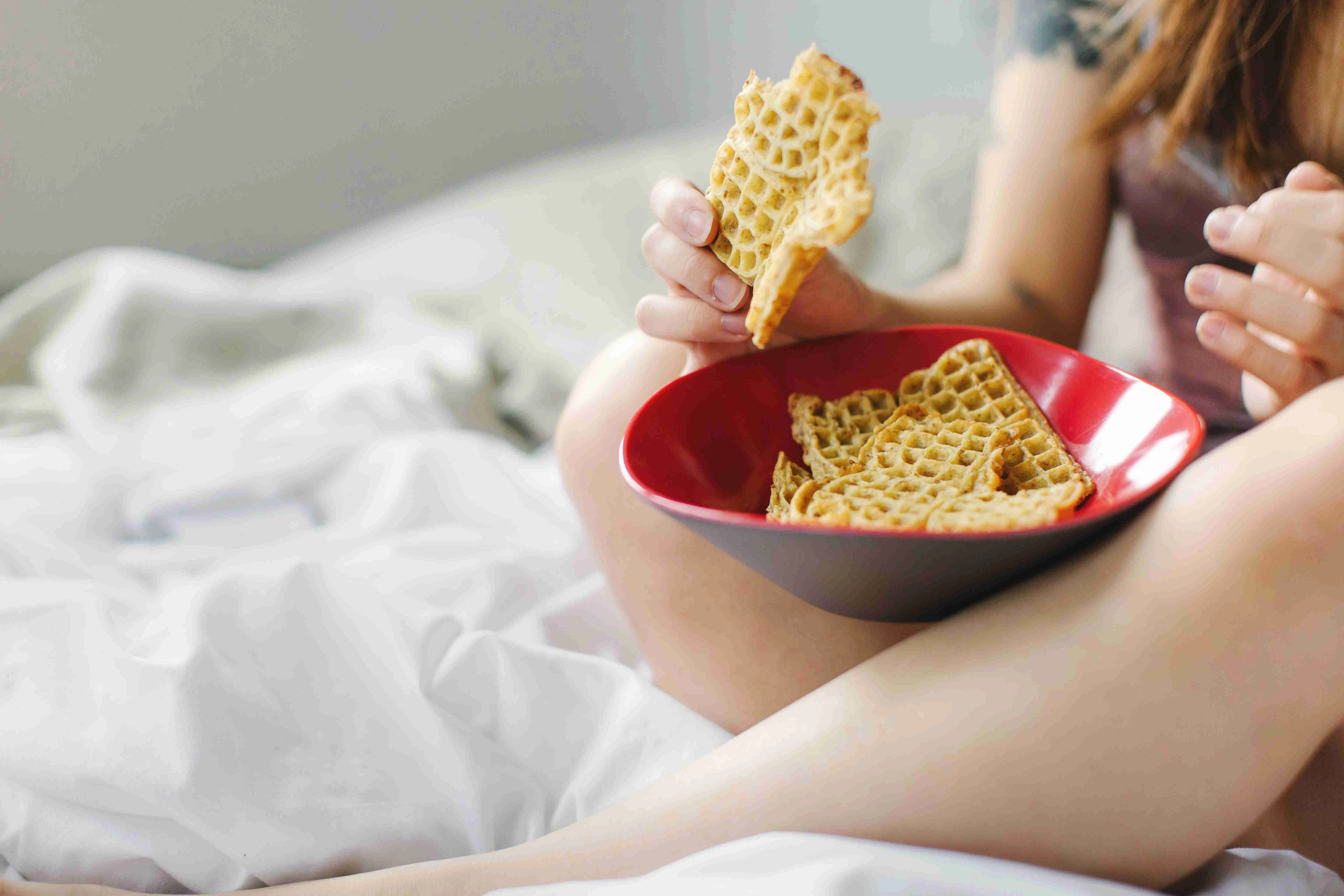We often overlook a simple yet effective tool: the bedtime snack. Choosing the right snack at the right time can enhance your sleep quality and overall health. The key lies in understanding what makes a snack "sleep-friendly" and how to incorporate it into your nightly routine.
In this article, we'll explore the world of healthy bedtime snacks, delving into their benefits, the science behind their effectiveness, and how to choose the perfect pre-sleep nibble.
Importance of Choosing the Right Bedtime Snack
The foods you consume before bed can significantly impact your sleep quality. Certain snacks can trigger digestive issues, disrupt your circadian rhythms, or cause fluctuations in blood sugar levels, leading to restless nights and difficulty falling asleep.
On the other hand, choosing the right bedtime snacks can help regulate your sleep-wake cycle, promote relaxation, and provide the necessary nutrients for optimal bodily functions during the night.
Criteria for Healthy Bedtime Snacks

When selecting a bedtime snack, it's essential to consider several factors to ensure it supports a restful night's sleep.
Digestibility
When selecting a bedtime snack, digestibility is crucial. The ideal snack should be easy on your digestive system to avoid disrupting sleep. Opt for foods low in fat and fiber, as these can slow digestion and potentially cause discomfort during the night.
It's also wise to avoid overly spicy or acidic foods, which may lead to indigestion or heartburn. Instead, choose gentle snacks on the stomach, allowing your body to rest and repair during sleep rather than working hard to digest a heavy or complex meal.
Nutrient Content
The nutrition content of your bedtime snack plays a significant role in promoting quality sleep. Ideally, your snack should contain a combination of sleep-promoting nutrients.
Tryptophan-rich foods, such as turkey, milk, yogurt, and nuts, are excellent choices, as this amino acid helps produce serotonin and melatonin, key regulators of sleep.
Magnesium, found in nuts, seeds, and whole grains, helps relax muscles and regulate sleep patterns. Complex carbohydrates, like those in oatmeal or whole-grain toast, can help make tryptophan more available to the brain.
Calcium, abundant in dairy products, aids in melatonin production, while Vitamin B6, found in bananas and fish, helps convert tryptophan to melatonin.
Portion Size
The size of your bedtime snack is just as important as its content. A small to moderate portion is ideal, typically around 150-200 calories. This amount is sufficient to satisfy hunger and provide sleep-promoting nutrients without overloading your digestive system.
Large portions can lead to discomfort and may disrupt your sleep rather than improve it. Remember, the goal is to provide your body with just enough sustenance to support restful sleep, not to have a full meal.
Calming Properties
Some foods have natural calming effects that can promote better sleep, making them excellent choices for a bedtime snack. Herbal teas, particularly chamomile, are known for their relaxing properties and can help prepare your body and mind for sleep.
Tart cherries and kiwis contain natural melatonin, which can help regulate your sleep-wake cycle. Warm milk has long been a traditional bedtime drink, and its soothing effect is both physical and psychological, potentially helping you relax and prepare for sleep.
Timing of Consumption
The timing of your bedtime snack is crucial for optimal sleep benefits. We recommend consuming your snack about 1-2 hours before bedtime. This timing allows for initial digestion to occur but is close enough to bedtime for the sleep-promoting effects of the nutrients to take hold.
Eating too close to bedtime can lead to indigestion and disrupt sleep, while eating too early might result in hunger pangs that wake you up in the middle of the night. Finding the right balance in timing can significantly enhance the effectiveness of your bedtime snack in promoting restful sleep.
Top 10 Healthy Bedtime Snacks for a Restful Night's Sleep

Healthy bedtime snacks can be categorized into dairy-based, nut-based, fruit-based, and herbal tea options, each offering unique benefits for promoting better sleep. Dairy products like yogurt and milk contain calcium, which helps sleep regulation.
Nuts are rich in magnesium and healthy fats, which can help relax the body and mind, while fruits, especially those high in melatonin like cherries, can naturally boost sleep-inducing hormones. Herbal teas, such as chamomile, are known for their calming properties that can ease you into a restful state.
Choosing snacks from these categories can support your body's natural sleep processes and improve your overall sleep quality.
Nutritional Facts About Healthy Snacks
The following table includes our top 10 snack lists, and their specific nutritional values may vary depending on the snack and portion size. Here are some general nutritional facts about the healthy bedtime snacks mentioned:
| What to eat before bed | Calories | Protein (g) | Carbs (g) | Fat (g) |
|---|---|---|---|---|
| Almonds (1 oz) | 163 | 6 | 6 | 14 |
| Greek Yogurt (1 cup) with Honey (1 tbsp) | 230 | 23 | 33 | 4 |
| Cherries (1 cup) | 87 | 1 | 22 | 0 |
| Banana (1 medium) | 105 | 1 | 27 | 0 |
| Oatmeal (1/2 cup dry) | 150 | 5 | 27 | 3 |
| Cottage Cheese (1/2 cup) | 104 | 14 | 6 | 2 |
| Kiwi (1 medium) | 42 | 1 | 8 | 0 |
| Herbal Tea (1 cup) | 0 | 0 | 0 | 0 |
| Whole Grain Crackers (6) with Peanut Butter (2 tbsp) | 250 | 8 | 21 | 16 |
| Warm Milk (1 cup) | 149 | 8 | 12 | 8 |
It's important to note that these are approximate values, and the actual nutritional content may vary based on the specific brand or preparation method.
Common Mistakes to Avoid When Choosing Foods to Eat Before Bed
While selecting healthy bedtime snacks is essential, there are some common mistakes to avoid:
- Consuming High-Sugar Snacks: These can cause spikes in blood sugar levels, leading to energy crashes and disrupted sleep.
- Eating Large Portions: Overeating before bed can lead to discomfort, indigestion, and difficulty falling asleep. Also, keep in mind not to binge eat before bed, as this causes digestion issues and may lead to nighttime eating disorder symptoms.
- Choosing Highly Processed Snacks: Processed snacks often contain additives, preservatives, and artificial ingredients that can interfere with sleep quality.
- Choosing Caffeinated Foods or Drinks: Caffeine is a stimulant that can disrupt sleep cycles and make it challenging to fall asleep.
- Ignoring Portion Sizes: Even healthy snacks can contribute to weight gain if consumed in excessive amounts.
When To Snack Before Bed

Eating before bed isn't always beneficial for health, as discussed earlier. However, when done thoughtfully and with the right choice of snack at the right time, it can have a positive impact.
Impact on Digestion
The timing of your bedtime snack can significantly affect your digestion. Eating too close to bedtime can lead to digestive discomfort and potentially disrupt your sleep. When you lie down shortly after eating, it becomes easier for stomach acid to flow back into the esophagus, increasing the risk of acid reflux and heartburn.
This is particularly problematic for those who already suffer from gastroesophageal reflux disease (GERD). We recommend finishing your last meal or snack between 2 and 4 hours before sleep to minimize these issues. This timeframe allows your body to begin the digestion process while you're still upright, reducing the likelihood of nighttime digestive disturbances.
Effects on Sleep Quality
The timing of your bedtime snack can have a notable impact on your sleep quality. Eating too close to bedtime may cause your body to focus on digestion rather than preparing for sleep, potentially leading to restlessness and difficulty falling asleep.
Furthermore, eating large meals or snacks high in sugar or fat close to bedtime can cause blood sugar levels to fluctuate, which may disrupt your sleep cycle. Going to bed hungry can also disrupt sleep because hunger pangs may wake you up at night.
Ideal Timing for Bedtime Snacks
The ideal timing for a bedtime snack is typically about 1-2 hours before you plan to sleep. This timeframe provides a good balance between satisfying late-night hunger and allowing for initial digestion to occur before lying down.
Consuming a small, nutrient-dense snack during this window can help stabilize blood sugar levels throughout the night, potentially aiding in a more restful sleep. This timing also aligns well with your body's natural circadian rhythm, as it allows your digestive system to slow down as you prepare for sleep. Remember, the goal is to provide your body with just enough sustenance to support restful sleep, not to have a full meal.
When to Avoid Snacking
While a light snack before bed can be beneficial for some, there are situations where it's best to avoid late-night eating. If you experience frequent acid reflux or GERD symptoms, it's advisable to avoid eating anything for at least 3 hours before lying down in bed. This helps prevent the backflow of stomach contents into the esophagus.
Additionally, if you're trying to manage your weight, be cautious about nighttime snacking, as it can easily lead to consuming extra calories and night-eating syndrome. It's also wise to avoid snacking if you've already had a large, satisfying dinner, as additional food isn't necessary and may lead to overeating.
Lastly, if you find that eating before bed consistently disrupts your sleep or causes discomfort, it might be best to adjust your eating schedule to finish earlier in the evening.
FAQs
How long before bedtime should I eat a snack?
Ideally, you should consume your bedtime snack approximately 1-2 hours before going to bed. This allows for proper digestion and prevents discomfort or disruptions during the night.
Can I combine multiple snacks for a more substantial bedtime meal?
While combining snacks is possible, it's essential to be mindful of portion sizes and overall caloric intake. Aim for a balanced combination that provides a mix of complex carbohydrates, protein, and healthy fats to promote sustained energy release and satiety.
Is eating before bed bad? Are there any specific foods to avoid before bed?
Yes, it's generally recommended to avoid snacks high in sugar, caffeine, or heavily processed ingredients, as these can disrupt sleep patterns and lead to discomfort or energy crashes during the night.
Can bedtime snacks help with weight management?
Bedtime snacks can potentially support weight management goals if chosen wisely and consumed in appropriate portions. However, it's essential to consider your overall caloric intake and ensure that the snack fits within your daily calorie budget.
Should I drink water with my bedtime snack?
Yes, it's a good idea to drink water or other hydrating beverages (such as herbal tea) with your bedtime snack. Staying hydrated can aid in digestion and prevent discomfort during the night.
Conclusion
By choosing nutrient-rich, easily digestible foods and consuming them at the appropriate time, you can support your body's natural sleep processes and wake up feeling more refreshed. It's important to listen to your body and find what works best for you, as individual needs can vary.
By incorporating these healthy snacking habits into your nightly routine, you're not just satisfying late-night hunger—you're investing in better sleep and, by extension, better overall health and well-being.
Helene Josephine Duun
Helene Josephine Duun is a medical anthropologist who specializes in public health research and communication. Always seeking a deeper understanding of how cultural values and practices influence health outcomes, she co-designs solutions with diverse groups to form collaborative partnerships that are responsive to changing needs. As an advocate for holistic health literacy, she also raises awareness of the vital role of quality sleep in overall health and well-being.


